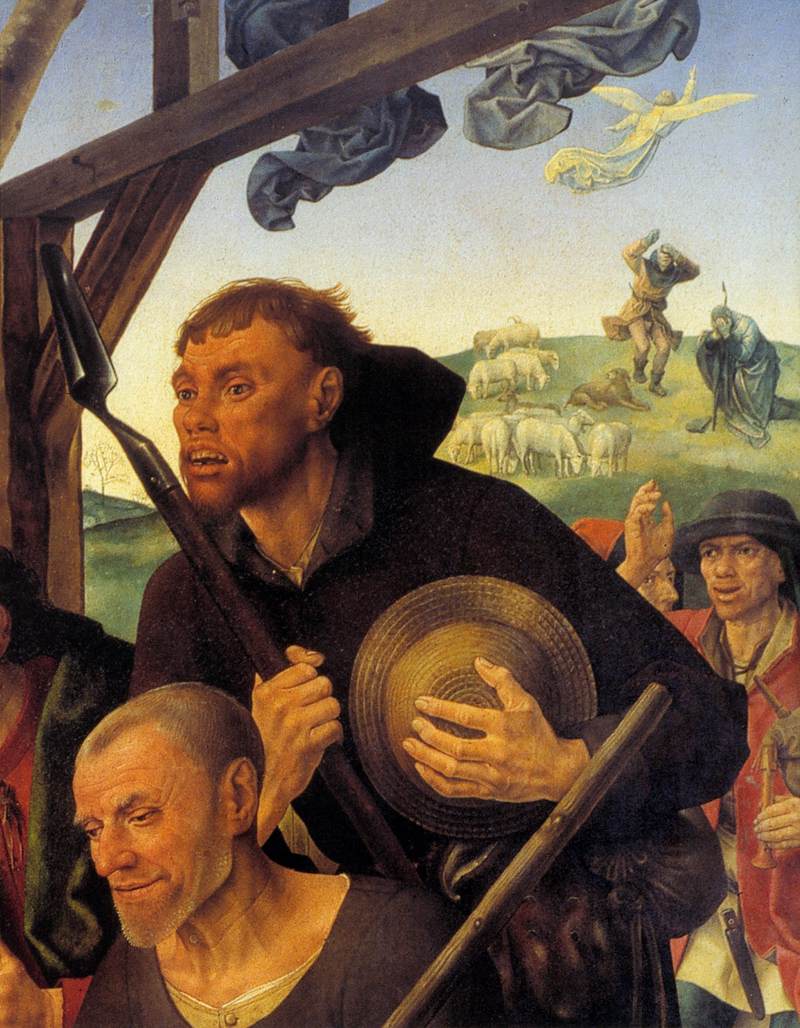December 26: Come As You Are
♫ Music:
The shepherds went back, glorifying and praising God for all that they had heard and seen, just as had been told them.
Luke 2: 20
COME AS YOU ARE
I’ll bet first century shepherds smelled like the sheep they tended, earthy and woolly. They probably had dirty fingernails, tattered clothes and unwashed faces. Spending so much time out in the fields away from the conveniences of civilization sounds like a rough and uncomfortable life. My tidy, suburban life is positively luxurious by most of the world’s standards, and yet I have more in common with the shepherds than the magi.
When Hugo Van Der Goes painted the Portinari Altarpiece, his depiction of the shepherds caused quite a splash. He was one of the first artists to show them as common men, rugged and unrefined. His shepherds look like regular people, and these humble men approach the Christ child with a sense of simple wonder and joy. Their faces reflect expressions of tenderness and delight in this baby and what His birth signifies.
Once at a family gathering, my toddler son picked up my camera. He pointed it at several of us, snapping picture after picture while we posed and clowned for him. It wasn’t until we printed the photos that we saw what he saw in our faces every day: gentle smiles, soft gazes, so much love.
The shepherds’ faces as they behold the Christ child reflect the joy, tenderness and adoration of beholding the Savior they heard about, the Messiah who has come to reconcile God and man. What good news! Can they even comprehend all that this means?
Can we?
Some days, I live under the illusion that I have to clean myself up in order to come before God, that I have to make myself good enough to be in His presence. Even at church, there’s a sense that we must tuck in our brokenness, our disappointments and our messiness in order to be acceptable.
“How are you?” people ask.
“Fine,” we say, even when we’re not fine.
“Fine,” we say, even when we’re hurting or doubting or lost.
Here are the shepherds—dirty, humble real. Here am I—hurting, doubting, real. God draws me to Him in the midst of my brokenness. Because of the work of Christ, I don’t need to become happy or faithful or hopeful before I can come to God. I can come as I am, just as I am. He knows my frailties, He knows that I am dust, and He has compassion on me in my brokenness. How wonderful that He loves me too much to let me stay that way!
Come and see, says the angel. Come as you are. Come now.
That’s good news for me, more shepherd than royalty, and it’s a reason to glorify and praise God for what I have seen!
Michele Hughes, Executive Assistant to the President
ALMIGHTY GOD, thank you for calling us when we were undeserving and for loving us right where we are today. Let us worship you as simply as the shepherds, that we may experience the joy of adoring Christ.
Adoration of the Shepherds from Portinari Altarpiece
Hugo van der Goes, 1440-1482
Galleria degli Uffizi, Florence, Italy
About the Artist and the Art
Born in or near Ghent, Belgium, Hugo van der Goes was enlisted as a member of the painters’ guild of Ghent as a master in 1467. His most famous work was the Portinari Altarpiece triptych. The central panel depicts the Adoration of the Shepherds. The central panel is also full of symbolic content: the sheaves of wheat in the foreground symbolize Christ’s sacrificial death and the placement of the babe is central to the meaning of the composition. Surrounded by empty space, he is alone among his adorers, suggesting his vulnerability and holiness (see Joel Shesley’s O Magnum Mysterium on Day 3).
About the Performers
From their inception, Selah has always been synonymous with the singing of hymns. In fact, the understated beauty of the trio’s 1999 debut, Be Still My Soul, helped initiate a hymn revival in Christian music that is still thriving today. Their discography has significantly re-popularized the church’s greatest songs while decorating the popular group with numerous Dove Awards, number one singles, sold out concert tours and over two and half million albums sold. Selah’s spirited Noel is sung in Kituba, the language of the Congo. Pray for the Congolese who have suffered much violence and civil rights abuse over the years that they will embrace the GOOD NEWS of NOEL.
Website: http://selahonline.com/
Noel Lyrics:
Noel, Noel
Yesu me kwisa ku zinga ti beto
Noel, noel
Yesu me kwisa ku zinga ti beto
Kana nge zola ku zaba mwana
Nge fwiti kwisa ku fukama
Kana nge zola ku zaba mwana
Nge fwiti kwisa ku fukama
Translation:
Noel, Noel
Jesus has come to live with us
Noel, Noel
Jesus has come to live with us
If you want to know the Child
You have to come kneel
If you want to know the Child
You have to come kneel
